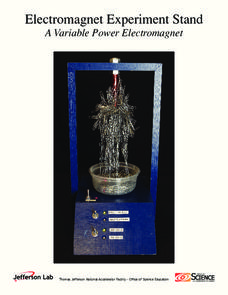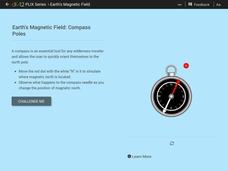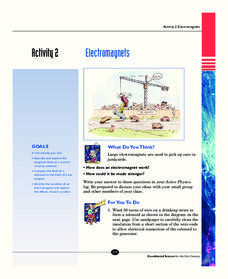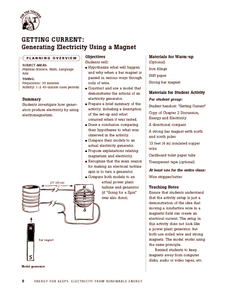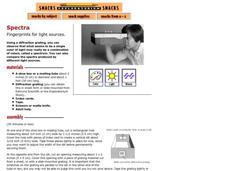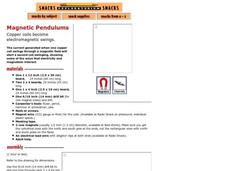US Department of Energy
Electromagnet Experiment Stand: A Variable Power Electromagnet
Electromagnets come in both large and small scales—from big machinery in scrap yards to hard disk drives. Here's a resource that provides directions for building a variable electromagnet on a stand. Scholars then experiment with the...
Next Generation Science Storylines
How Can We Sense so Many Different Sounds from a Distance?
Dive into the mystery of sound waves! Scholars brainstorm questions about how sound travels and why different items make different sounds. They then conduct experiments to answer their questions.
DiscoverE
Electromagnetic Fishing Pole
Let's go fishing ... for paper clips! Individuals create a device that attracts paper clips. This device relies on an electromagnetism, where a flow of electricity in a loop of wire wrapped around a nail causes magnetism.
CK-12 Foundation
Earth's Magnetic Field: Compass Poles
You'll be strangely drawn to this activity! Physical science pupils learn how compasses work in an interesting interactive. The content covers magnetic poles, Earth's magnetic field, and what would happen if Earth's poles swapped places.
CK-12 Foundation
Doorbell
What are some simple uses for an electromagnet? Scholars explore the electromagnetic circuitry in a doorbell through an interesting simulation. They control the core material, number of loops, amount of current, and strength in a spring....
CK-12 Foundation
Galvanometer
In 1820, Hans Christian Orstead discovered the link between electricity and magnetism, which allows us to measure current and voltage. The simulation allows scholars to observe the inner workings of an ammeter and voltmeter as they...
CK-12 Foundation
Telegraph
Most pupils don't know what a telegraph is, much less how one works. A secret simulation has scholars pick the size of the primary and secondary loops, the battery voltage, and which letters in the Morse Code they want to transmit. They...
Urbana School District
Magnetism
The compass was first used in 206 B.C., but we didn't discover magnetic poles until 1263 A.D. Presentation begins with the history of magnetism before continuing on to magnetic fields, magnetic forces, electromagnets, currents,...
Teach Engineering
Building an Electromagnet
Your pupils can build their own electromagnet — awesome! The culminating activity in an eight-part series challenges groups to design and build their own electromagnet. The goal of the activity is to build a magnet capable of picking up...
Teach Engineering
Circuits and Magnetic Fields
Have your class use compasses to try to find the magnetic field around an electric current. Groups use the same technique to visualize magnetic fields as they did in the second activity in the series, but this time, the field is created...
Teach Engineering
Electricity and Magnetic Fields
Introduce your class to the idea of magnetic fields around electrical wires with an activity that provides the information about the direction of a magnetic field around a wire carrying an electric current.
Teach Engineering
Induced EMF in a Coil Wire
Small groups investigate the interaction between a coil of wire and a magnet to create an electromagnetic field and observe the voltage they create. Through further interactions, they realize a conductor can be charged from the...
Exploratorium
Motor Effect
The magnetic wire. Class members create a magnetic field by running electricity through a wire. The video included in the resource provides information on how this effect is used to make electrical motors.
It's About Time
Force Fields
Young scholars investigate both bar and horseshoe magnets. They explore force fields with a compass and iron fillings before making an electromagnet. This is the first in a series of nine lessons.
Virginia Department of Education
Work and Power
Assist your class with correctly calculating the values for force, work, and power as they determine the amount various activities require. They gather data and participate in a group discussion to compare results upon conclusion of the...
It's About Time
Electromagnets
Young scientists build their own electromagnet and test it by picking up paperclips. Analysis questions evaluate knowledge at the end of the activity.
Energy for Keeps
Getting Current: Generating Electricity Using a Magnet
Give your class a magnetic charge with this creative experiment designed to teach emerging scientists about electromagnetism. Pupils construct a model that demonstrates the function of an electrical generator and test this creation in a...
International Technology Education Association
Tidy Up Those Sloppy Force Fields!
It is just magnetic. This resource presents the concept of Earth's and another planet's magnetic field and how spacecrafts detect them. Learners study a problem using magnetometers and participate in three experiments to come up with a...
K12 Reader
Magnetic Attraction
Teach your class about magnets and electromagnets with a reading passage. After reading the passage, learners respond to five related questions.
University of Florida
The Magic School Bus and the Electric Field Trip
Energize a shared reading of the Magic School Bus and the Electric Field Trip with this collection of supplemental materials. Whether your looking for discussion questions, reading comprehension worksheets, or writing prompts, this...
Exploratorium
Stripped Down Motor
Mostly for teacher's use, here are instructions for making a traditional electromagnetic motor and a detailed explanation of how it works.
Exploratorium
Spectra
Make a class set of spectrum tubes by first purchasing some diffraction grating, and then constructing the tools with mailing tubes or shoe boxes. If you aren't up for assembling them, you could purchase prepared spectroscope kits. This...
Exploratorium
Magnetic Suction
Drive an electric current through a coil of wire and show how it can pull a nail right into its core. This vivid demonstration exhibits the electromagnetic field. Consider also showing your class a few of the devices that make use of...
Exploratorium
Magnetic Pendulums
Passing a copper wire coil through a magnetic field influences another coil to also sway. It is with this demonstration that you can teach your physical science fans about electromagnetism. Note that the assembly requires about an hour,...


